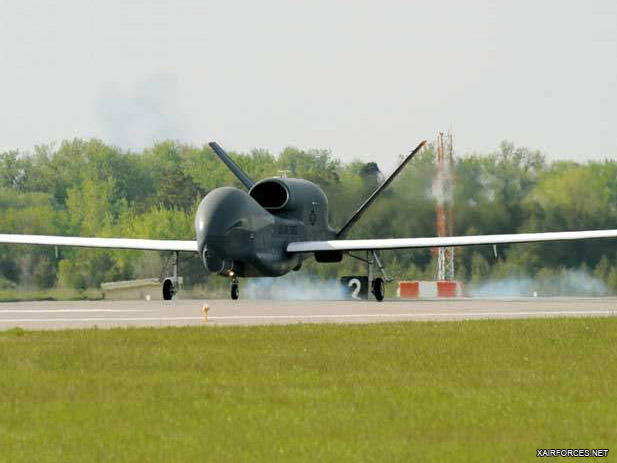
USAF Plans To Terminate Block 30 Global Hawks

The U.S. Air Force wants to terminate the Block 30 Northrop Grumman RQ-4 Global Hawk high-altitude unmanned surveillance aircraft, breathing new life into the five-decade-old U-2 program, the Defense Department announced Jan. 26.
Deputy Defense Secretary Ashton Carter said the Pentagon would stop buying the Block 30 version of the Global Hawks, which are designed to collect imagery and signals intelligence. The Air Force would also mothball what remains of its recently acquired fleet.
The Block 30 “had priced itself out of the niche,” Carter said. “That’s the fate of programs that are too expensive.”
The Air Force had been planning to buy 42 Block 30 aircraft. According to 2011 budget documents, the cost of each aircraft was around $215 million. It was not immediately clear how many Global Hawks the Air Force has.
The aircraft is being terminated mainly due to its high cost to buy and maintain, but it has also failed to live up to the promises the program had originally offered, sources said.
A Defense Department document released as part of Defense Secretary Leon Panetta’s briefing to reporter reads:
“When we initially invested in the Global Hawk Block 30 program, it held the promise of providing essentially the same capability as the U-2 manned aircraft for significantly less money to both buy and operate. As the program has matured, these cost savings have not materialized and, at best, we project the future cost of Global Hawk Block 30 operations to be comparable with the U-2. In this five-year budget, the cost of the Global Hawk program would significantly exceed the cost of the U-2 so we canceled Global Hawk Block 30 and extended the U-2 program.”
Northrop released a statement Jan. 26:
“The Pentagon announced today that it is planning to cancel the Global Hawk Block 30 program and plans to perform this mission with the U-2 aircraft. Northrop Grumman is disappointed with the Pentagon's decision, and plans to work with the Pentagon to assess alternatives to program termination.
“The Global Hawk program has demonstrated its utility in U.S. military operations in Iraq, Afghanistan and Libya, as well as its utility in humanitarian operations in Japan and Haiti. Just a few months ago, the Pentagon published an acquisition decision memorandum regarding Global Hawk Block 30 that stated: ‘The continuation of the program is essential to the national security ... there are no alternatives to the program which will provide acceptable capability to meet the joint military requirement at less cost.’”
The U-2 program, according to the statement, “places pilots in danger, has limited flight duration, and provides limited sensor capacity. Extending the U-2’s service life also represents additional investment requirements for that program.”
"Northrop Grumman is committed to working with our customers to provide the best solutions for our country and our allies. We are pleased with the continuing support for the Global Hawk Block 40 system, as well as for the Navy's Broad Area Maritime Surveillance system and our other unmanned systems."
Grumman officials could not immediately comment.
Carter said that the Block 40 Global Hawk, which is equipped with the Multi-Platform Radar Technology Insertion Program (MP-RTIP) radar, would not be affected by the decision to terminate the Block 30. The MP-RTIP is a powerful ground surveillance radar designed to create photo-quality imagery of the Earth’s surface and overlay moving ground targets over those.
The Navy’s Broad Area Maritime Surveillance version is also unaffected.
Likewise, NATO’s proposed buy of five modified MP-RTIP-equipped Global Hawks for its Alliance Ground Surveillance program and Germany’s EuroHawk program will not be affected.
The demise of the Global Hawk means that the U-2 has a new lease on life. A source close to the Air Force said that the venerable aircraft is being improved.
Source: By DAVE MAJUMDAR - 26 January 2012- The Defence News(www.defensenews.com)
Photo: The U.S. Air Force intends to terminate the Block 30 Northrop Grumman RQ-4 Global Hawk, the Defense Department announced. (Photo by Tech Sgt. Johnny Saldivar / Air Force)
(26.01.2012)
|